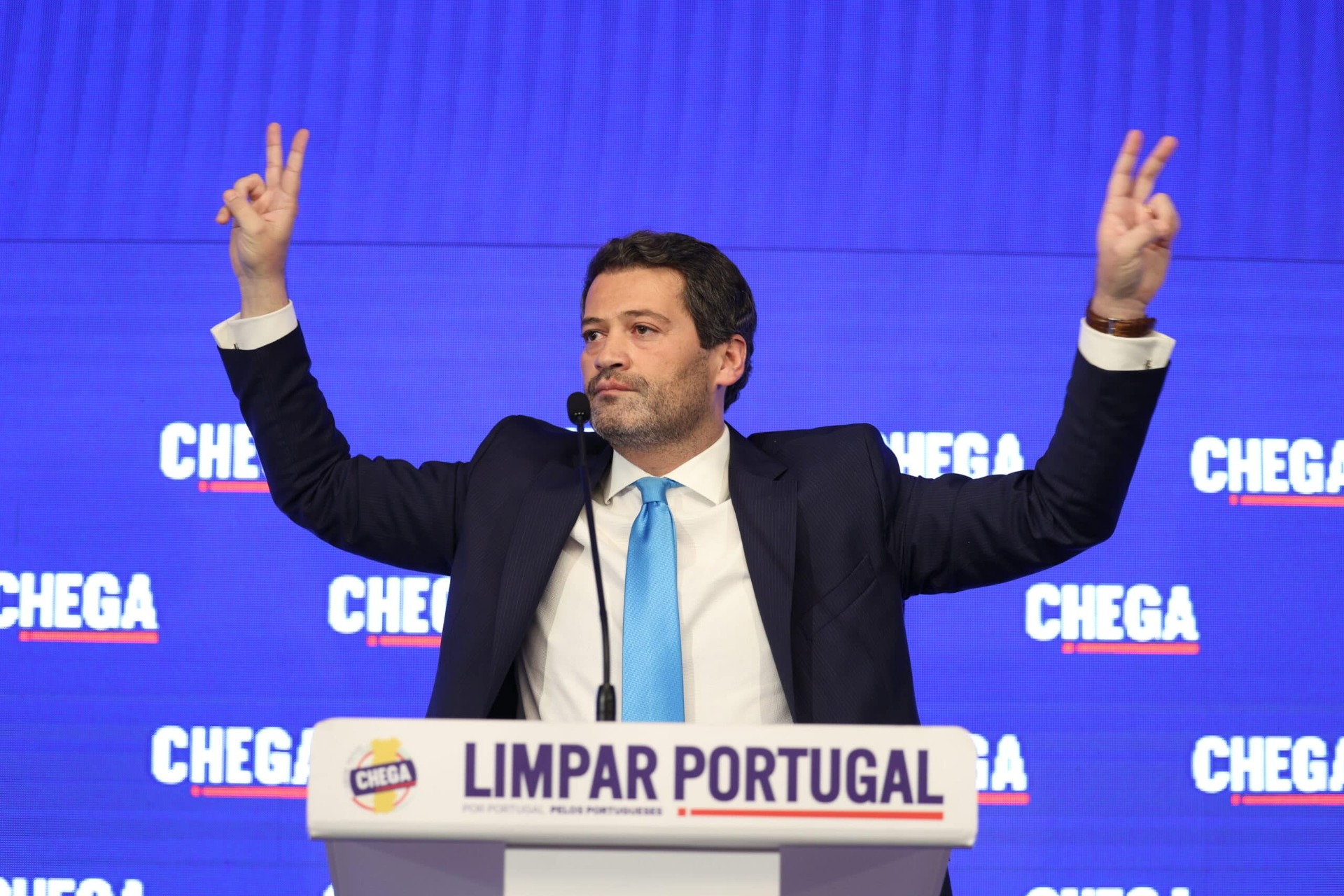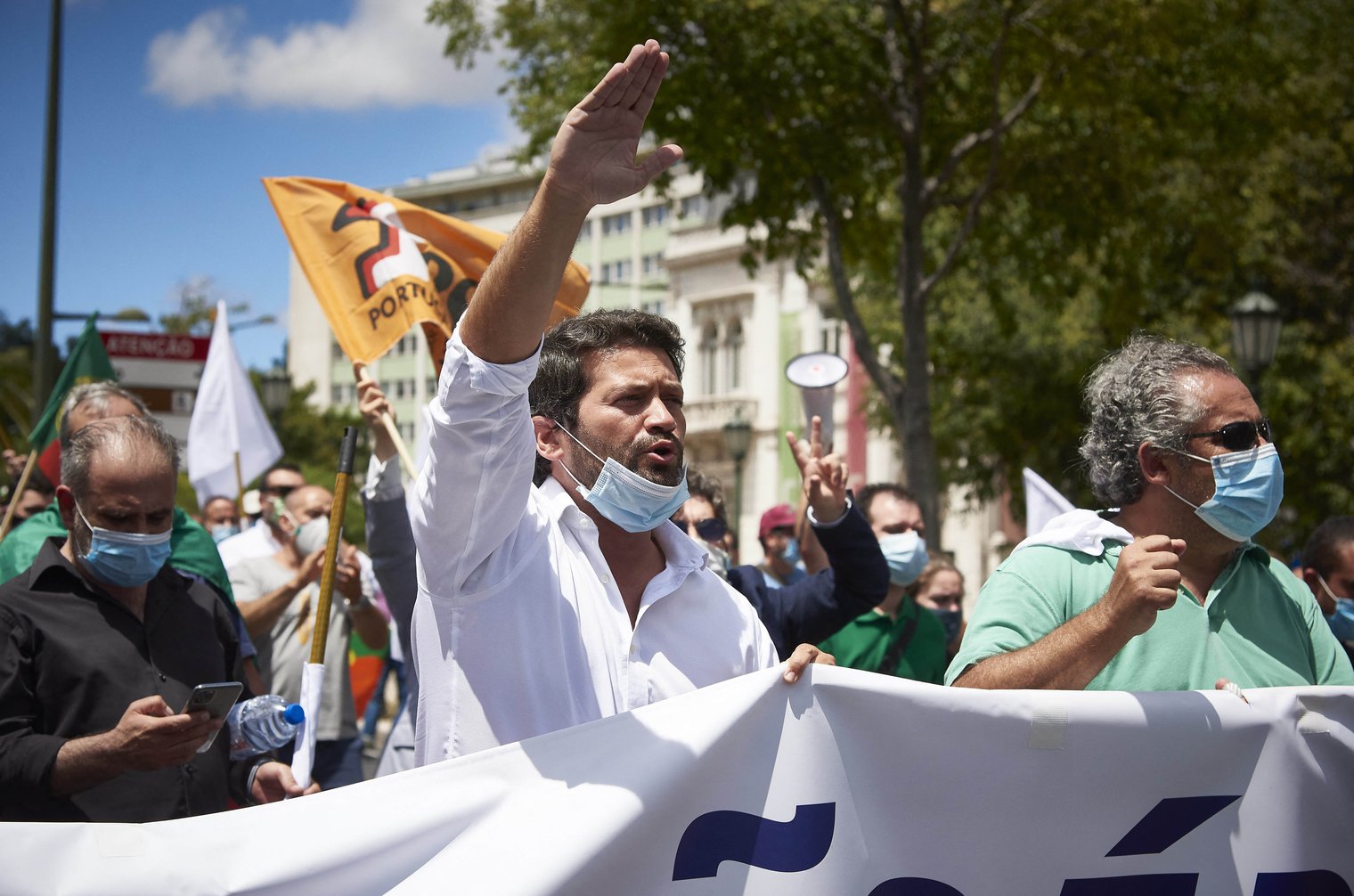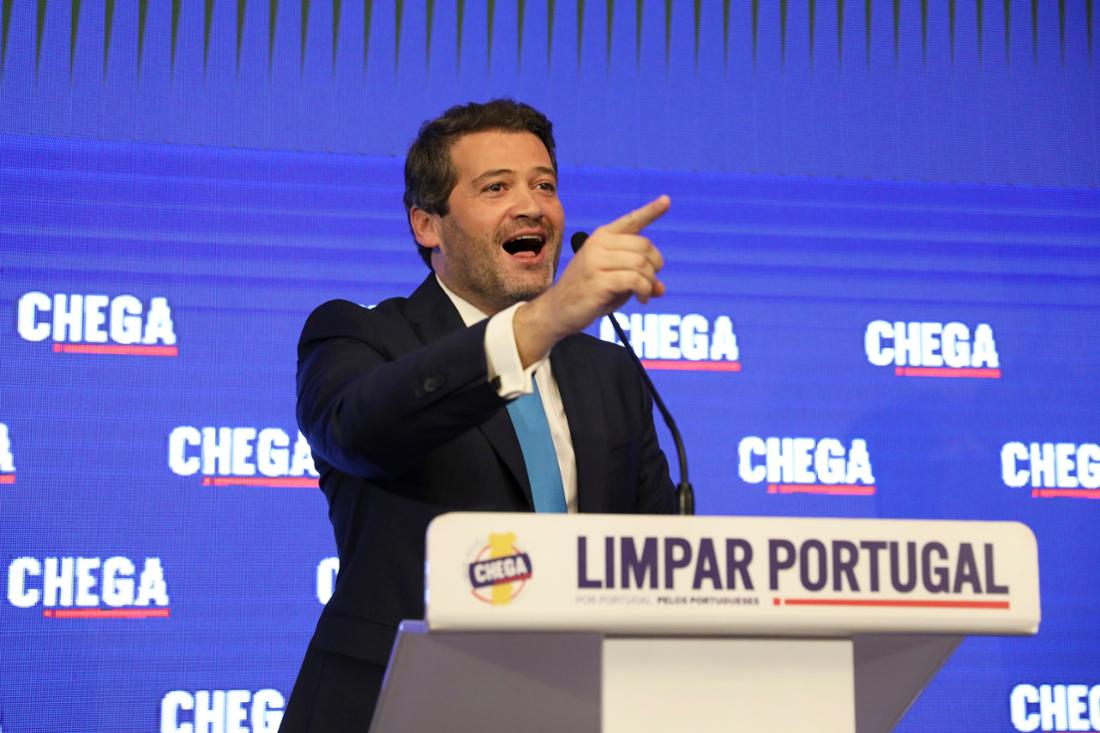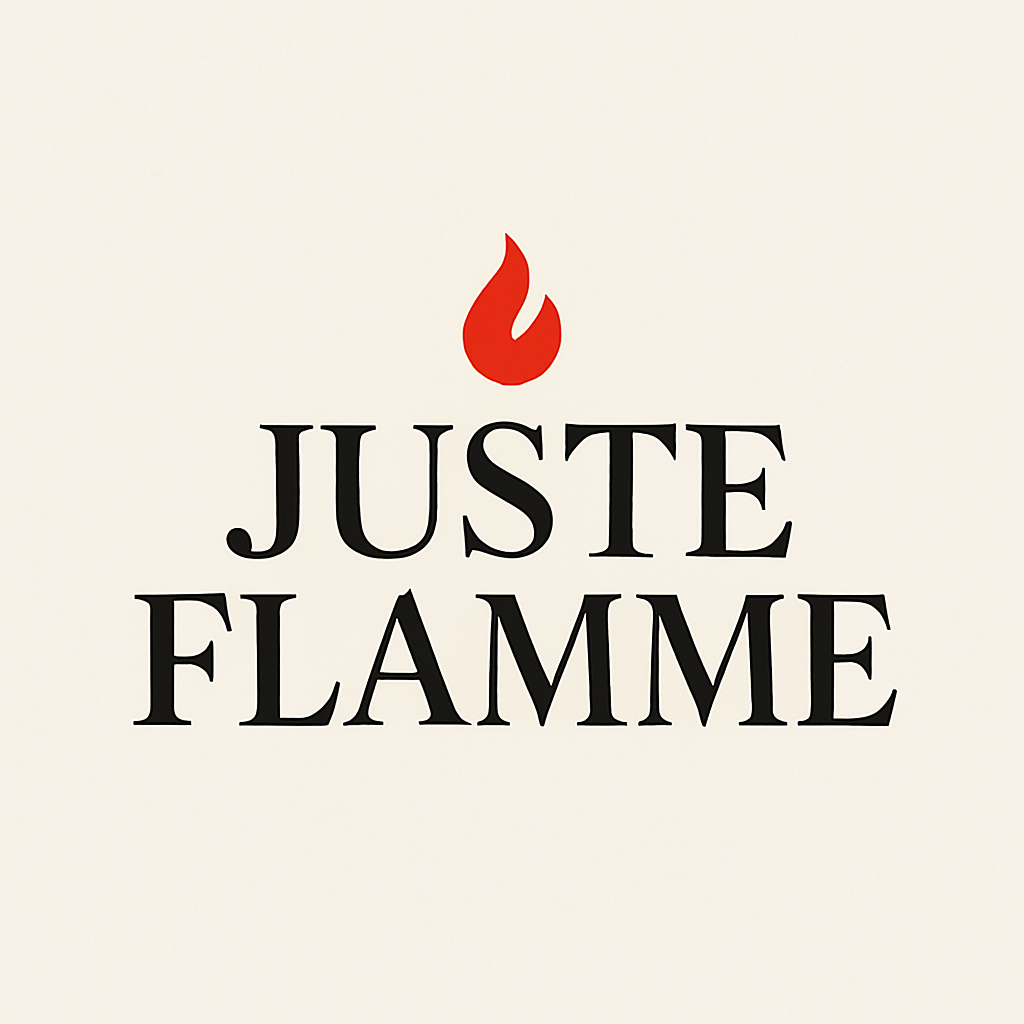Chega and the Erosion of Portuguese Democracy
How André Ventura's far-right movement shattered Portugal's post-dictatorship consensus, and what's at stake if we let history repeat itself.
"Never Again" Was a Promise. Not a Suggestion

On the morning of April 25, 1974, as tanks rolled into Lisbon with carnations in their barrels and soldiers refusing to fire on the people, Portugal breathed for the first time in almost fifty years. Censorship collapsed, prisons opened, and the cold silence of authoritarian rule gave way to chants of liberdade. A country long buried under Salazar's Estado Novo dictatorship had chosen its resurrection.
What followed was messy, imperfect, and miraculous: a young democracy forged out of fear and resolve. For decades, despite economic crises, austerity, and political scandal, Portugal held firm against the far-right wave that swept across Europe. While France flirted with Le Pen, while Hungary fell to Orbánism, and while Spain gave rise to Vox, Portugal seemed untouchable, a country still allergic to fascism, still too close to its trauma to consider going back.
That myth died in May 2025.
In the most recent legislative elections, the far-right party Chega surged to 58 parliamentary seats—matching the Socialist Party and becoming the second-largest political force in the country. Led by the incendiary André Ventura, Chega has shattered the post-revolutionary consensus and brought Portugal face-to-face with a question it thought it had buried: could it happen again?
This article is not just about the rise of another far-right populist. It's about the calculated dismantling of democratic norms through scandal, division, and fear. It's about how racism, authoritarian nostalgia, and international disinformation networks converge to erode trust in institutions. It's about a political project designed not to participate in democracy, but to hollow it out from within.
And it's about why, if we fail to act now, Portugal could become the next domino to fall in the global retreat of democracy.
"Never again" was not a slogan. It was a warning. And it must be our call to action.
The Roots of the Backlash: Chega's Emergence from the Wreckage
Chega did not fall from the sky. It emerged from the cracks.
For years, Portugal simmered with quiet disillusionment. After the global financial crisis and years of EU-imposed austerity, many Portuguese—especially in the working and lower middle classes—felt left behind. Wages stagnated, rents exploded, public services shrank. Meanwhile, the traditional political establishment kept trading power back and forth like poker chips, caught in a perpetual stalemate of bland centrism and tepid reform.
Enter André Ventura.
A former law professor and TV football commentator with a flair for provocation, Ventura began his political career inside the center-right PSD. But when that platform no longer satisfied his appetite for attention and hardline posturing, he broke off and created something new: a party designed to sound like a movement, to look like a rebellion, and to act like a weapon.
Chega—Portuguese for "Enough!"—was born in 2019 with a single seat in parliament and a simple, emotionally charged message: Portugal is broken, and only we are brave enough to fix it.
What followed was a textbook play from the authoritarian populist handbook. Ventura used the language of the street, scapegoated minorities (especially the Roma), denounced the "corrupt elites," and painted journalists, judges, and NGOs as enemies of the people. He stoked division, fed grievance, and wrapped it all in a nationalist flag.
But what made Chega particularly dangerous wasn't just its rhetoric. It was its strategy.
This was not a protest party. It was an insurgent campaign—designed to normalize the extreme, infiltrate institutions, and make itself indispensable to future right-wing coalitions. Ventura didn't want to shout from the sidelines. He wanted a seat at the table—and he's getting closer to pulling up a chair.
Chega's Ideological DNA and the Authoritarian Blueprint
Chega sells itself as a nationalist party, but the packaging is the least of it. Behind the slogans about "order," "patriotism," and "traditional values" lies a far more calculated and dangerous ideological project. One that borrows from the darkest chapters of European history while dressing itself in the aesthetics of modern populism.
At its core, Chega is not just conservative. It is counter-democratic. It seeks to undo the institutional architecture that protects individual rights, judicial independence, and democratic pluralism in Portugal. Its vision is not one of reform, but of regime transformation.
André Ventura has been clear about this, even when he wraps it in euphemisms like "re-foundation" or "cleaning house." He has called for a rewriting of the Constitution. He has advocated for removing judges who do not align with what he calls "the will of the people." He has repeatedly questioned the legitimacy of elections, court rulings, and independent media coverage when they do not favor his party.
This is not political disagreement. It is an attack on the liberal democratic order.
Chega's platform includes reinstating life sentences, creating privileged legal status for "native Portuguese," and reducing the number of MPs in parliament to consolidate executive power. Ventura has also floated the idea of mandatory military service and increased surveillance of "radical elements," which in his vocabulary typically means immigrants, Muslims, and left-wing activists.
Social conservatism is not an afterthought in this project. It is a central pillar. Chega opposes abortion rights, LGBTQ+ protections, and gender equality policies, portraying them as "leftist ideology" rather than human rights. The party's vision of family is strictly heteronormative, patriarchal, and exclusionary.
Its "law and order" rhetoric mirrors that of Trumpism in the United States or Bolsonaro's Brazil. Crime is exaggerated, often racialized, and used as justification for hardline policing and expanded state powers. The fact that Portugal has one of the lowest crime rates in Europe is irrelevant to Chega's narrative. Fear, not facts, drives the message.
And crucially, all of this is presented not as extremism, but as common sense. Chega's greatest weapon is its ability to present radicalism as reason. To turn democratic decay into a patriotic duty.
It is this ability to cloak authoritarianism in the language of moral clarity that makes the party so effective. And so dangerous.

The Scandals That Reveal the Rot
Every authoritarian project wraps itself in the illusion of moral purity. Chega is no exception. It presents itself as the antidote to corruption, the party of "clean politics," the voice of those fed up with systemic decay. Ventura has built his brand around denunciation, pointing fingers at others, calling for mass resignations, prison sentences, and political purges.
But behind the crusading speeches lies something else entirely. Chega is not an alternative to political rot. It is a new vessel for it.
Since its founding, Chega has been plagued by internal scandals, many of them involving senior figures in the party. In early 2025, three high-profile cases shattered any illusion of moral superiority.
Miguel Arruda, a Chega deputy representing the Azores, was caught on airport surveillance footage stealing suitcases from luggage belts in Lisbon and Ponta Delgada. A police search uncovered several bags and personal belongings at his home. His defense? That the video had been "manipulated with artificial intelligence." He eventually left the party, but kept his parliamentary seat.
In Lisbon, Nuno Pardal Ribeiro, vice-president of the party's district leadership, was accused of paying for sexual services from a 15-year-old boy. This came after he publicly endorsed a proposal for chemical castration of pedophiles. The contradiction was grotesque. His political downfall was swift, but the damage was done.
Then came José Paulo Sousa, a Chega representative in the Azorean legislative assembly, who was arrested for drunk driving. He blew twice the legal alcohol limit. Unlike the others, he publicly apologized. But it was yet another crack in the party's carefully polished law-and-order image.
The reaction from Ventura was damage control. He distanced himself from the accused. He denounced their actions. But none of this erased the deeper truth: these cases were not anomalies. They were symptoms.
Chega is a party obsessed with projection. It accuses others of exactly what it protects within its own ranks. It rails against corruption while shielding allies. It calls for national moral regeneration while incubating figures whose actions betray every word of that mission.
Even beyond these scandals, the party has faced serious questions about its funding. Businessman César DePaço, a Chega supporter with ties to the American far right and the Portuguese diaspora in Florida, was revealed to have donated significant amounts to the party, raising concerns about influence, transparency, and foreign entanglements. While DePaço insists the donations were legal and limited, his close ties to Ventura suggest more than a passing relationship.
For a party that claims to defend the homeland against foreign manipulation, Chega has shown little hesitation in welcoming international backers, especially those linked to global far-right networks.
These scandals are not unfortunate coincidences. They are structural. Because Chega is not a party built on values. It is built on resentment. And resentment, when it becomes political capital, attracts the worst kind of opportunists.
What we are witnessing is not a corruption of a movement. It is a movement born out of the logic of corruption, the corruption of truth, of institutions, of democratic integrity.
Chega's Transnational Web: Alliances, Money, and the Illiberal International
Chega likes to present itself as proudly nationalist, deeply Portuguese, rooted in tradition and uniquely tailored to the nation's history and challenges. But this is only part of the story. Beneath the rhetoric of sovereignty and independence lies a sophisticated international alignment. Chega is not an isolated phenomenon. It is part of a global authoritarian ecosystem.
From its earliest days, André Ventura sought legitimacy and visibility through alignment with the international far right. He built bridges with Marine Le Pen's National Rally in France, Matteo Salvini's Lega in Italy, Santiago Abascal's Vox in Spain, and Viktor Orbán's Fidesz in Hungary. Chega is a member of the European group Identity and Democracy (ID), a parliamentary bloc in Brussels that has become a hub for Europe's anti-democratic forces.
These alliances are not symbolic. They are strategic. They offer ideological cover, financial resources, digital coordination, and mutual amplification. Ventura's talking points about "globalist elites," "inverted racism," "gender ideology," and "the tyranny of Brussels" are not homegrown. They are imported, recycled, and adapted from a playbook used by far-right actors across Europe and North America.
The financial side is murkier but no less alarming. As in the case of France's National Rally, which received loans from Kremlin-linked banks, there are growing concerns that international far-right movements are supported by shadowy networks of donors with geopolitical agendas. In Chega's case, the clearest connection is to the Portuguese diaspora in the United States, particularly in Florida and New Jersey, where right-wing émigré communities have helped fundraise and organize support for Ventura.
César DePaço, the aforementioned businessman with dual Portuguese-American citizenship, is emblematic of this transatlantic connection. DePaço, who once served as honorary consul in Florida, has been linked to far-right Republican circles in the US and has publicly supported Ventura's ambitions. His financial contributions, while officially declared as legal and within limits, point to a growing internationalization of Portugal's far-right infrastructure.
More broadly, Chega benefits from the global machinery of digital disinformation. Ventura's media strategy is lifted directly from Trumpism: flood the zone with controversy, accuse all critics of bias, portray the leader as a victim of a corrupt establishment. On platforms like YouTube, Telegram, and Facebook, Chega-aligned influencers disseminate conspiracy theories, anti-immigrant content, and culture war outrage with astonishing reach.
André Ventura has also flirted with broader projects of authoritarian convergence. In multiple appearances, he has expressed admiration for Jair Bolsonaro, former president of Brazil, and for Donald Trump. The common thread is clear: a belief in strongman politics, contempt for pluralism, and a tactical embrace of chaos to consolidate power.
This is not accidental. It is coordinated. Chega is not merely responding to domestic grievances. It is surfing a wave that crosses borders, linking authoritarian populists in a shared mission to discredit liberal democracy, hollow out the rule of law, and replace cooperation with nationalist belligerence.
In a moment when Europe is being tested from within, Chega has placed Portugal squarely on the authoritarian map.
Why Chega's Rise Threatens More Than Just Politics
What Chega represents cannot be measured by electoral math alone. Its 58 seats in parliament are alarming, yes. But its real impact runs deeper than seat counts or coalition talks. Chega is not simply changing who governs. It is changing how politics is understood, how dissent is treated, and how democracy is experienced on the ground.
The threat Chega poses is not just to institutions. It is to the political culture that underpins them.
Since its arrival, the boundaries of acceptable discourse in Portugal have shifted. Statements that would have been unthinkable a decade ago, like open attacks on Roma communities, denials of systemic racism, nostalgia for the authoritarian past, are now regular features of televised debates. The media, in trying to "balance" its coverage, has at times normalized extremism under the guise of neutrality. And other parties, even those who claim to oppose Chega, have adopted watered-down versions of its rhetoric, hoping to recapture lost voters.
The Overton window is moving, and it is moving toward authoritarianism.
But the rot is not just rhetorical. It is legal, procedural, institutional. Chega has openly proposed constitutional revisions to weaken the judiciary and centralize executive power. Ventura has called for the removal of Constitutional Court judges who "disrespect the will of the people." He wants to reduce the number of MPs in the Assembly, limit judicial oversight, and strengthen police authority. These are not random ideas. They form a coherent authoritarian strategy: delegitimize the referees, overwhelm the rules, and control the narrative.
André Ventura does not want to govern in a pluralistic system. He wants to break it and rebuild it in his image, one where dissent is criminalized, minorities are vilified, and power is concentrated.
Already, there are signs of damage.
Community organizations have reported increased hate speech, particularly online, targeting Roma, Black Portuguese, immigrants, Muslims, and LGBTQ+ individuals. Teachers who speak out against Chega's ideology report being harassed. Journalists face coordinated campaigns of defamation. Even judges and prosecutors are accused of being part of a "leftist conspiracy" when they investigate Chega-aligned individuals.
Chega's politics is not just opposition. It is polarization. And in a country with recent memory of dictatorship, polarization can become a gateway to something far more dangerous.
Perhaps most worryingly, Chega has cultivated a growing base of support among police and military personnel. In speeches and social media posts, Ventura often frames these forces as the last bastion of "true patriots" against a "decadent political class." This kind of rhetoric has historical echoes that Portugal should not ignore.
When authoritarian movements begin to align themselves with arms of the state, democracies do not die. They are killed.
This is the future Chega is trying to manufacture, not with tanks in the streets, but with ballots, microphones, and algorithms.
And unless Portugal wakes up to the scale of that threat, the damage may become irreversible.

Why "Never Again" Must Mean Action Now
Portugal is not sleepwalking into authoritarianism. It is being pushed systematically, relentlessly, and strategically, by a movement that knows exactly what it is doing. Chega is not a protest vote gone rogue. It is a deliberate project of democratic dismantling. And the response cannot be one of denial, appeasement, or comfortable nostalgia.
"Never again" is not a memory. It is a mandate.
We are no longer living in a time where the threats to democracy wear uniforms or march in the streets. Today, they wear suits, hold microphones, and win elections. They speak the language of the people, but act in the interests of power. They claim to restore dignity, while degrading the very principles that give democracy meaning: pluralism, equality, dissent, accountability.
Portugal cannot afford to look the other way. Not after a dictatorship that lasted 48 years. Not after a revolution built on courage and sacrifice. Not after decades of slow but steady democratic progress.
The danger now is complacency.
If democratic forces across parties, civil society, media, and institutions, continue to treat Chega as just another party, it will become just another party. Its extremism will be normalized, its ideas absorbed, its influence institutionalized. And once that process reaches critical mass, rolling it back becomes exponentially harder.
We have seen this play out in Hungary. In Poland. In the United States. In Brazil. The path is always the same: delegitimize the system, weaponize public frustration, dismantle checks and balances, and use the machinery of democracy to destroy it from within.
Portugal is still in time to stop it.
But that requires action. Not just from political leaders, but from all of us.
It means journalists refusing to normalize extremism in pursuit of clicks.
It means judges and prosecutors standing firm in the face of intimidation.
It means educators teaching democratic values with courage.
It means artists, workers, lawyers, nurses, students, all refusing to be silent while hate is rebranded as patriotism.
And it means voters showing up. Voting not just for policies, but for principles. Not just for parties, but for the very possibility of a shared future.
Chega cannot be defeated with slogans. It must be defeated with strategy, solidarity, and truth.
Because democracy is not self-sustaining. It lives or dies through the choices we make.
Portugal's Democracy Is Still Young, and Still Worth Defending
Fifty-one years after the Carnation Revolution, Portugal stands at another historic threshold. The threat is not external. It is not military. It does not come wearing medals or boots. It comes in the form of electoral victories, populist slogans, and promises of national rebirth.
Chega is not the return of fascism by force. It is the return of authoritarianism by consent.
It has risen not because people suddenly stopped believing in democracy, but because too many began to feel that democracy had stopped believing in them. That sentiment is real. It must be heard. But it cannot be answered by those who offer only division, fear, and scapegoats.
Portugal is a young democracy. It is still fragile. Still learning. But it is also resilient. It has weathered crises before. It has resisted pressure. And it still carries in its DNA the spirit of April 1974, the belief that dignity, freedom, and justice are not luxuries. They are non-negotiable.
This moment demands that belief again. Not in ceremony, but in conviction. Not in silence, but in defiance.
Democracy is not inherited. It is renewed, generation by generation, election by election, act by act.
We are the generation that must now defend it.
We are the generation that must draw the line.
We are the generation that must say, once again, and with all the force of history behind us:
Never again.
📨 Stay Informed. Stand Up.
All our work is published freely on Juste Flamme's Substack, because the defense of democracy should never be paywalled.
But if you believe in what we do, confronting authoritarianism, exposing disinformation, and standing up for a free, inclusive society, consider becoming a paid subscriber.
Your support helps us go further, dig deeper, and reach more people in the fight for truth and liberty.
